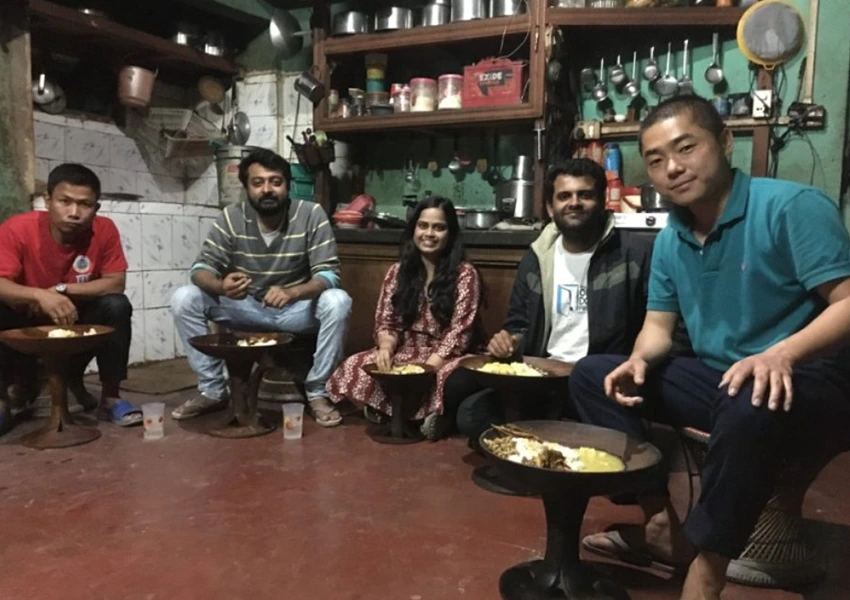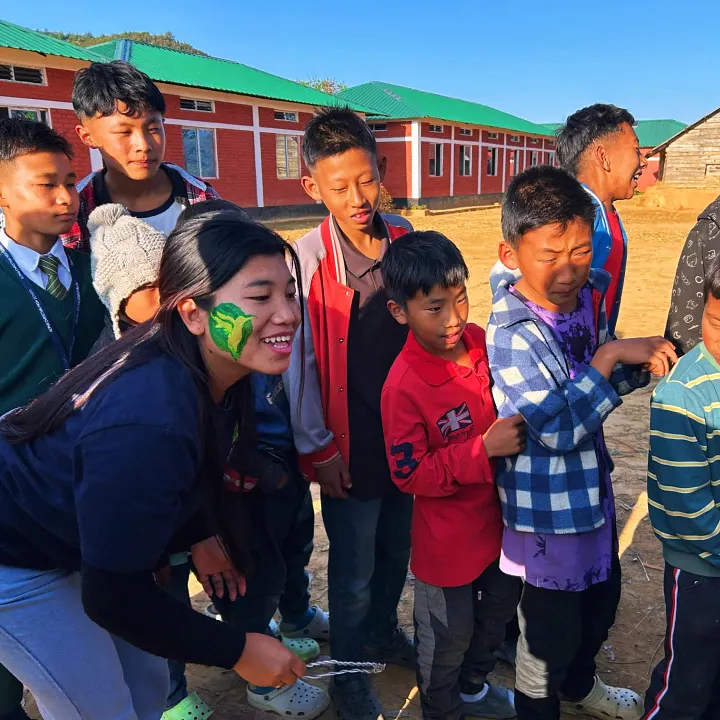Sunbird Trust, in collaboration with The Open Door Project, is helping set up first libraries in some of the remotest villages in North-East India. Poorva Deshpande, an intern who came by in February 2020 for this project, went to 4 different locations to help set up libraries. She beautifully narrates her experience in Mukalini, a remote village in Nagaland. Read on to know more.
It was a lazy morning. We had just arrived in Mukalimi the previous evening. Tired from a long, camel ride like journey, I had slept like a baby that night, finding it difficult to feel active this particular morning. I had gotten used to getting up at dawn. I KNOW! So unlike me. No, but that took a backseat the day I came back to my city. Sigh! Anyway, I came out of my room. No one was up yet. I went to the kitchen.
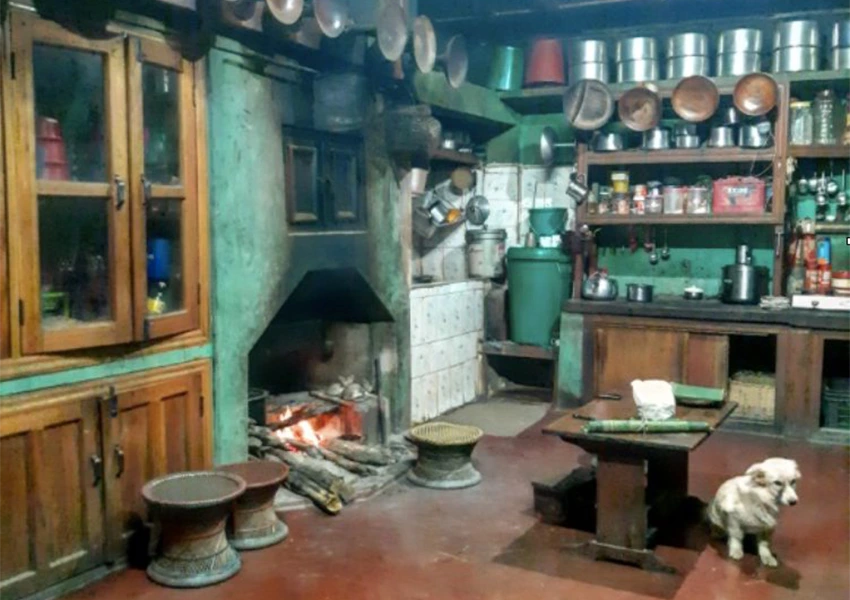
The kitchens in Nagaland had a vibe. Huge rooms with a blend of antiques and moderns. The cooking corner, conventionally equipped with a gas stove, a few modern equipment and plastic containers, clashing with the rest of the part of the kitchen. The rest looked straight out of a Nagesh Kuknoor movie. Every kitchen had a rustic fireplace and a small compartment just above the fireplace where they would keep things to ferment. One of the walls would ideally be decorated with the traditional Naga wooden-stand plates in all shapes and sizes hung royally in order. Daggers and knifes so huge one could get scared and I couldn’t help but wonder what they might be used for. Kittens running around the kitchen and finding a warm, cosy spot by the fireplace when tired. The kitchen was the one place in every house where one normally spent the most of their daytime.
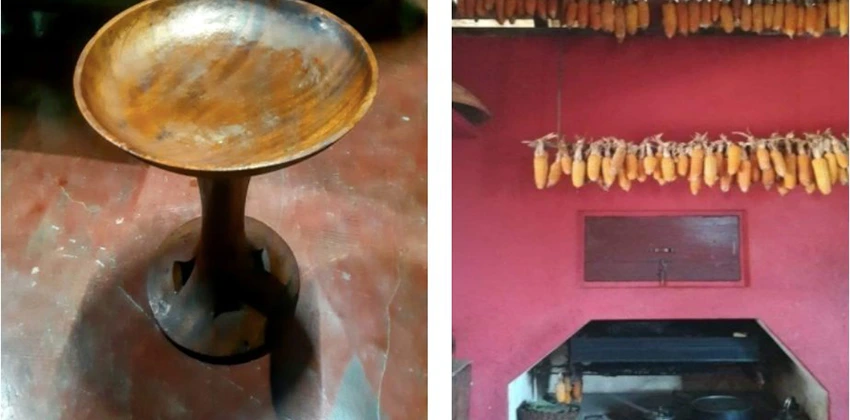
I went to the kitchen. Mother was sitting by the fireplace. A strong matriarch, probably in her 60s. One could see the years of hard work and experience with every wrinkle on her face.
It seemed like a morning ritual. I guessed that she sits by the fireplace every morning, sipping tea before she goes out to feed the chickens.
She said something in her language. I was confused and I looked around to see if her son was up yet, so he could translate it for us. But he wasn’t there. I just went and sat by the fireplace. I wanted to make conversation. I started saying things in English, thanking her for having us over and telling her that I had had a good sleep. She kept speaking in her language. I was confused but I didn’t look away from her eyes. Her expressions gave away a few words and sentences, so I went with the flow. I requested her for some warm water. I signaled at the fire and the kettle on it. She understood.
She said, “Gorom Pani?”
I exclaimed “Yes. Yes yes correct. Oh! Thank you.”
“Aaah.. Thank you… ayyee… Welcome Hahhahahah!” She went.
She was so surprised at her own ability to utter a few English words. It was surreal.
So the people in this village spoke ‘Sumi’. But while talking to outsiders they would quickly switch to Nagamese thinking that’s the universal language. My Ajji does that too! Once I had a German friend over and the way my Ajji talked to her in Hindi, I felt nothing could stop her from conveying whatever she wanted to.
Nagamese is funnily close to Bengali, which I don’t understand either, but there are a few familiar words.
So that’s how it was. Mother would talk to me in Sumi or Nagamese, I would reply in English or Hindi and we actually had magical conversations.
That’s how I didn’t have a problem finding ingredients in the kitchen to make tea or Bhurji, or get some Gorom Pani for myself. She lent me her Mekhla on the Library Inauguration day and dressed me up, explained how to wear it, how not to wrap it, told me that my top needs to be tucked inside the belt, yelled at me when I accidentally dropped her Mekhla on the floor and then dusted it and wrapped it around me again with no grudge and a big smile on her face, all this while speaking a mix of Sumi, Nagamese and English (Thank you and Welcome). Laughing, giggling and staring at me in admiration. I like to think I was doing the same.
Our conversations were so smooth and easy going, no stress of not knowing each other’s languages, not feeling any need to have someone translate it all for us. In her words I could feel the love, the concern, the blessings, the appreciation, the praise, the disappointment, the gratitude.
I guess we had learnt to sense the tone.
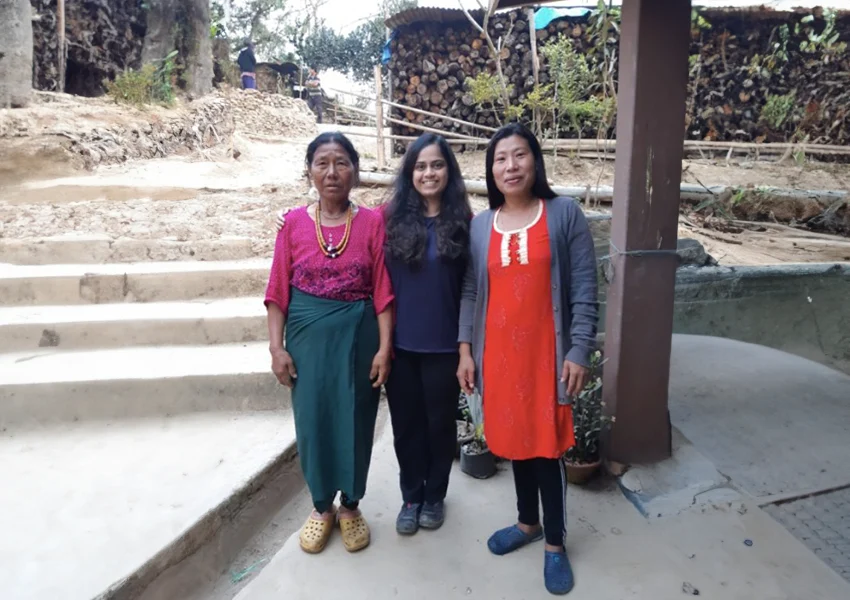
All my student and adult life until now, I have dedicated it to learning a foreign language, teaching my students the importance and necessity of learning a foreign language or a new language in general. I have tried my hand at two new foreign languages in the last three years. I know the advantages of knowing a language and the opportunities that come with it. But never in my dreams had I thought I would be able to engage in a conversation with someone, in spite of the language barriers, with such ease and fun.
While saying our goodbyes on the last day of our stay she expressed how all of us hadn’t got a chance to sit together and pray. And so there we were at 6 in the morning, in the kitchen, obviously, sitting in a circle, praying. Everyone closed their eyes, some of them held each other’s hands, one had his hands and fingers clasped together, one didn’t know what to do with the hands, so he just let them be. As for me, I joined my palms, something that doesn’t come naturally to me. I was praying after quite some time, may be years. I don’t know, but I think what I felt was nothing short of a spiritual experience. Mother was loudly chanting her prayers. We could feel the integrity and the depth of the verses. We could feel the tone.
Aloshe Aloshe Aloshe! She ended her prayers!
We opened our eyes, hurried ourselves since we had a bus to catch. That was hectic travel back to Manipur that day, somehow catching the last jam-packed bus to Imphal with some of us having to sit on the top of the bus, all of us stressing over the state-wide internet outage due to some communal riots. Yet, at the end of that day I felt peaceful and calm.
Let’s just say that the Morning Prayer had set the tone of our day.
